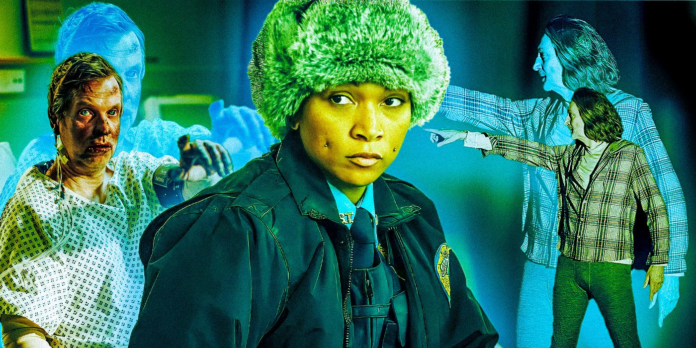Summary The recurring symbol of pointing in True Detective: Night Country represents Navarro’s belief that something otherworldly is coming for her, causing her to feel a lack of control in her life.
Navarro’s pointing visions reflect her unresolved trauma and personal paranoia, revealing her troubled past and her fear of being afflicted with the same condition as her sister.
The ambiguity surrounding the pointing scenes raises questions about the link between imagination and reality in the show, forcing both the characters and the audience to constantly second-guess themselves and their beliefs.
Warning: Contains SPOILERS for True Detective: Night CountryTrue Detective: Night Country is full of cryptic meaning and strange metaphors, yet one recurring symbol throughout the series remains more prevalent – and baffling – than the rest. Throughout the show, state trooper Evangeline Navarro has encountered both real and imaginary figures who have stopped to point at her. Some, such as a little girl in True Detective episode 5, have seemed fairly innocent. Others, like the corpulent Anders Lund, have been genuinely terrifying. Yet every pointing incident actually contains a hidden meaning that helps explain the show’s wider themes.
A key concern throughout True Detective: Night Country has been the balance between the temporal and the spiritual. While Navarro and Jodie Foster’s Liz Danvers attempt to solve two puzzling cases, there is an undercurrent of supernatural energy that permeates the show – leading both the characters and viewers to question what is and isn’t real. True Detective’s repetitive pointing forms a key part of this uncertainty. However, while most of the ghostly goings-on in Ennis seem to affect multiple people, the pointing is mostly concentrated around Kali Reis’ Navarro – and with very good reason.
True Detective’s Pointing Ghosts Reflect Navarro’s Trauma
Alongside her determination to solve the riddle behind the Annie K murder, a key part of Navarro’s character has been her history of familial trauma. In flashbacks, viewers have been given glimpses into Navarro’s troubled childhood (one of which includes her mother sinisterly pointing at her). In the present, she has also had to contend with her sister experiencing terrifying visions while battling with her own belief that she is also afflicted with the same condition. It’s this combination of unresolved trauma and personal paranoia that explains the pointing in True Detective.
Related Every Song In True Detective: Night Country & When They Play True Detective: Night Country’s soundtrack has several atmospheric songs that effectively channel the brooding and mysterious ambiance of the show.
Whether the pointing Navarro experiences is real or not, the moments are indicative of her belief that something otherworldly is coming for her. To her, the points demonstrate that she has been chosen by a power over which she has no control. Of course, it remains unclear whether there’s any truth to these assertions, but that is beside the point. Ultimately, for all Navarro’s desire to have control (exemplified by her refusal to let Annie K go), deep down she feels as though her life is not really in her hands. The ghostly pointing is a terrifying reminder of this anxiety.
Night Country’s Pointing Ties Into True Detective’s Other Visions
Close
Not only is Navarro not the first True Detective character to experience disturbing visions, she is also not the first to doubt what is and isn’t real. In True Detective season 1, for instance, Rust Cohle saw flocks of birds spontaneously forming a spiral and an apparent portal to the demonic Carcosa – both moments which were left deliberately ambiguous. Navarro’s experiencing similar phenomena is proof that True Detective is once again examining the link between imagination and reality in Night Country.
Just as in season 1, Navarro’s pointing visions raise questions about her state of mind as a character and the entire show’s view on the occult. Either Navarro and Rust’s visions are real, in which case True Detective becomes an explicitly supernatural drama, or they are imagined, providing an insight into the characters’ psyches. Either way, the ambiguity around the moments is powerful. Like the characters, the audience is constantly required to second-guess themselves about what they believe. Moments like the pointing scenes help True Detective: Night Country to transfer the paranoia felt by a character to the viewer in a terrifyingly effective way.
